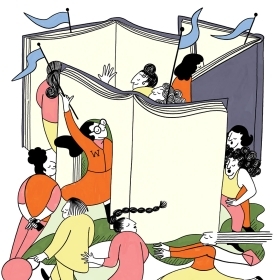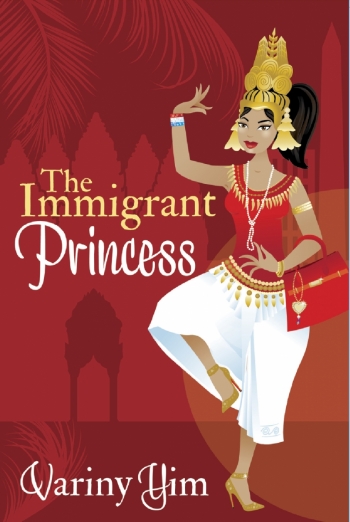In this debut novel, Variny Yim ’90 tells the story of three generations of Cambodian women coming to terms with life in the United States after the horrific losses of the Cambodian genocide. While it is fiction, not her family’s story, the novel draws deeply on Yim’s own immigrant experience. She came to the U.S. in 1975, at age 6½.
Why did you want to tell this story?
I returned to Cambodia for the first time in 2006 and was a little scared about what I would find there. All I really had ever heard was about the war, Pol Pot, the Khmer Rouge, the genocide. Everything was negative and sad. But when I visited, the people were joyful, kind, humble, and generous with what little they had. Visiting Angkor Wat and the temples was life changing for me, since it exemplified the beauty and greatness of Cambodia. It’s a reminder of what our ancestors created at one time, and the strength and resiliency of Cambodians over years of war, turmoil, and discord. One day, I realized that many of the people surrounding me were survivors of the genocide—in the streets, at the market, in the villages. They had suffered, starved, lost family and friends and all their possessions. But they continued to live their lives as happily and peacefully as they could.
I decided to write a story that talks about the Cambodians who are trying to rebuild their lives here in America. It’s a universal story about love, family, intergenerational and cultural misunderstandings and mishaps. But, it’s against the backdrop of a family of four Cambodian women from the royal family who live in the shadow of the genocide every day, but still try to create a life filled with joy, happiness, and simple pleasures.
How did the writing go?
You don’t know what you’re sitting on top of until you get to the computer. All of a sudden, this magical thing happens, and it’s at your fingertips. All this information that you’ve accumulated in your lifetime just pops up, and you’re pouring out everything that you’ve needed to get out.
What was your own family’s experience?
This is a very hard thing for me to share, but I wrote this book in honor of my father, Youvaing Yim, who was killed in Tuol Sleng, Pol Pot’s secret prison. Writing this book took me on a parallel journey of finding out what happened to my father and his family. It was a gut-wrenching experience, but now I feel extremely connected to what happened during the genocide. And, I dedicated the book to my children, Maile and Napali, so that one day they will read this story and not forget their history and what happened to their grandfather. That is really my truth in writing this book.
Grace is a senior associate editor of Wellesley magazine.








We ask that those who engage in Wellesley magazine's online community act with honesty, integrity, and respect. (Remember the honor code, alums?) We reserve the right to remove comments by impersonators or comments that are not civil and relevant to the subject at hand. By posting here, you are permitting Wellesley magazine to edit and republish your comment in all media. Please remember that all posts are public.